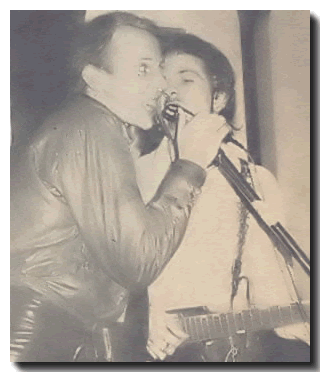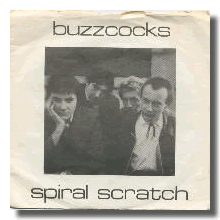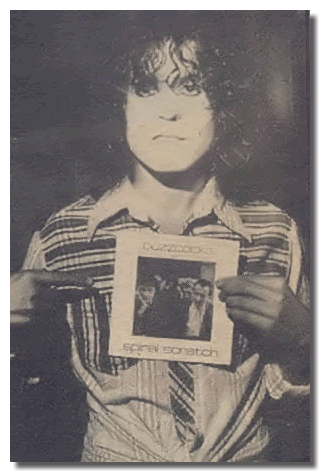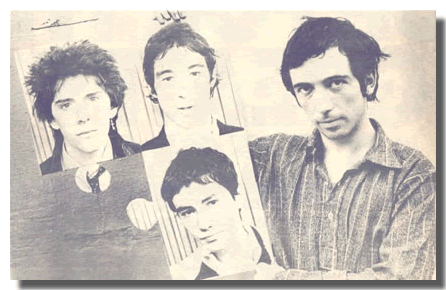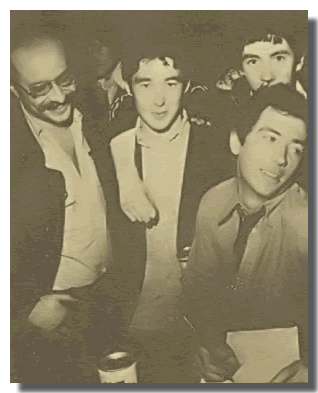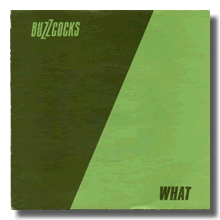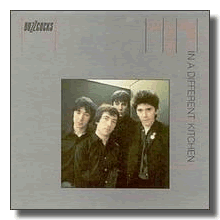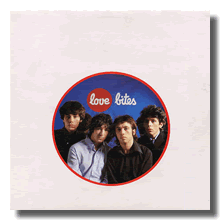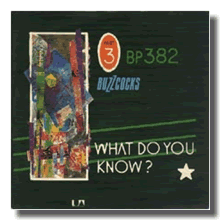PROTO PUNK PURE POP AND
OTHER BITES & SCRATCHES
RICHARD COOK assesses the career and impact of "the world's first modern pop group," 1976-81.
PETE SHELLEY holds up exhibit 'A' for the defence:clockwise
Steve Garvey, Steve Diggle, John Maher.
1 April 1976: Buzzcocks play their first gig, Bolton Institute of
Technology. Two numbers - "We started the second so fast they
couldn't switch us off" (Peter Shelley).
To TALK of pop history-to sketch in or fumble towards a genealogy of #
commercial, youth music that flags the moments and faces and noises of proper significance -
is maybe a foolhardy undertaking, Hindsight can be valuable, of course, but it cannot rekindle #(or revoke) the feel of a particular rush and its
split-second importance.
Turning on a radio and being transfixed by an unexpected music; glimpsing an image or a
movement on a screen or a stage; running home breathless with a new record. . . the
intransigence, the momentary heat of pop music reduces history to an errative and illogical
string of memory pockets, flashes and fragments stitched by personal favours, affections,
exposures and chance encounters.
The beauty of 'everyone has their favourites' means that such incredibly diverse groups as
The Sex Pistols, The Clash and Buzzcocks dominated 1977 - in the same way that Abba,
Television and Graham Parker also did. Or, to put it another way, what you remember most -
be you artist, consumer or critic in guise - is your historical mainline, Your memory is your
perspective.
Buzzcocks are one of the things I remember most; and I'd suggest that their impression stuck
to many memories - more, perhaps, than that of their peer groups who've lasted far longer
- many influential memories, Buzzcocks cast an influence over an articulacy they helped to
uncage, the lovers' remorse they revelled in, a credence in pure romance and the sharktooth
drone they played on and finally played out - and at the same time they remained tangential to
all their following groups.
They became a trigger, a catch loosened on the great stretch of possibilities not indulged in by
what we can responsibly refer to as post-Buzzcocks pop.
THE HISTORY of Buzzcocks, like the history Buzzcocks are inside, can best be remembered as
a jumbled, uncertain sequence of snapshots: so let's reconsider, in a love sometimes touched
by anger, what Buzzcocks left, behind them - three LPs, a dozen 45s, an opportunity never
quite grasped.
'Spiral Scratch', the one (legitimate) surviving example of Buzzcocks under the joint
guidance of Pete Shelley-and Howard Devoto, stands up well, if pale and scratched - both as
a hastily scribbled blueprint for the two different directions Shelley and Devoto were to take
and as a pre-emptive foray into the treatment of the sheer frustrations of affection between
people which moderne pop has now come to accept and rationalise.
What Devoto was singing about on the four scrappy little songs - recorded in a beat-the-
studio-clock rush at the very end of 1976 - was a view of love as a source of boredom,
resentment, release, very occasional relief: no great revelation, maybe. But the way it was put
over - in Devoto's own sickly snarl, in Shelley's strangely spangled chords ('starway guitar' as
the credit had it), in 16-year-old John Maher's impetuous and irritating drum rolls - linked it with
the punky clamour that Buzzcocks almost accidentally found themselves caught up in and
whispered of a revitalisation of the eternal concern of pop music.
'Boredom"and 'Breakdown' - titles entrenched in the spirit of '76-coursed across emotional
battlegrounds with the same charged fervour that 'the punks' were employing to (mostly) far less
coherent ends. The grey polaroid on the cover spoke as eloquently as the noise: Devoto
diffident and faintly smug, Maher blankly youthful. Steve Diggle (then playing bass) distantly
tough, Shelley furtive but inquiring.
Buzzcocks were always a Manchester band. They wore their provinciality defensively and it told
partly to their advantage; absent from the forcing house of the London scene for much of the
time they didn't have to squander their breath. But it critically delayed their progress, time and
again.
It was a rather cruel irony that music which depended on speed of delivery should have taken
so long to actually emerge. By the time 'Another Music In A Different Kitchen' finally appeared
in the early spring of 1978 we'd already assimilated 'The Clash', two Jam LPs, 'Ambition',
'Holidays In The Sun', and 'Shot By Both Sides'.
Devoto had quickly outgrown his first group. It left Buzzcocks to Shelley, and this shy, strangely tempestuous
player found he had his own group to play with, 'Orgasm Addict' was the first Buzzcocks single of UA, with
Diggle moving to guitar and the lone appearance of the rotund Garth on bass. It spun on one of Devoto's
wickedest lyrics, a gamut of images scattered like shrapnel -
"You're making out with schoolkids, winos and heads of states /
You've even made it with the lady who puts the little plastic bodies on the Christmas cakes" - and it
unveiled Shelley's voice, a quavering highness pressed resolutely into a virtue.
Most of all, it roared. It stormed. It started like a thundercrack, bolted over 1 :58 without the least tremor of
hesitation and hit the buffers minus any dislocative jolt. Martin Rushent's production made Buzzcocks gleam
where Foot's sound had subdued The Clash and Thomas had mired the Pistols in stodge.
BUZZCOCKS RELEASED the second UA single, 'What Do I Get?', in January 1978. Almost directly
contemporary with Magazine's 'Shot By Both Sides', Shelley's song somehow faced all the trauma which
Devoto, for all his brilliance, always viewed with a cooler detachment.
'What Do I Get?' is probably the most significant and prophetic single of its era. It begins with a guitar chord
reverse-echoed into sudden focus, like an indecision abruptly channelled into impassioned certainty, before
the now immortal "I just want a lover like any other, what do I get" Shelley sings it with a kind of
insomniacal ("I only get sleepless nights!") entreaty in his voice, bridging the forlorn and the frustrated; the
instruments charge and blur the simple chord pattern and the middle section has one guitar merely twanging
out the melody - an emblem rooted in the very foundations of beat group playing.
That classical pop feel, twinned with the sense of a new confrontation with the emotions that Buzzcocks seemed
to be dealing with; the almost unearthly tensions brought about by Maher's drumming and the fragility of the
singing - no other group was making music like this, 'What Do I Get?' is Shelley's Buzzcocks at their most
complete and untainted: it is virginal in its unaffectedness. Its brief flirtation with the lower reaches of the
charts did it no justice whatsoever.
If 'What Do I Get?' set a standard they could mostly only allude to - another transient moment - then 'Another
Music Is A Different Kitchen' at least progressed on its implications. In shape their first LP took the form all
its successors were to follow: a first side of short, flaring pop songs and a second where Shelley's insecure
fascination with structure and electric noise was given a greater rein. Fittingly, it garnered a mixed reception. Buzzcocks were never supposed to
be an LP group.
Shelley exorcised Devoto's influence by racking their last collaborations beside his own newer songs. 'Fast Cars', 'You Tear Me Up' and 'Love
Battery' were explorations of how the inanimate harboured metaphors of raw feeling, masques of intellectual diversion: Shelley tore through
them. His contributions to the first side were romantic in a way Devoto dared not face - 'No Reply' was straight telephone angst. 'Get On Our
Own' explicable adolescent hunger and 'Sixteen' - well, 'Sixteen' bled all over 'Substitute' ("You only want me because I'm so young!") and set its
iron-grey chords to finger the bogus hard rockers of the new wave. When Shelley blurted that it went "on and on and on" he sounded bitterly
disappointed at the surrounding truth.
Along with 'I Don't Mind', which begins the second side, it was a group of songs conceived and executed with the stinging, reverberant purity that
imbued records like 'Fifth Dimension' or 'With The Beatles' Âexcept the way it walked, talked, stripped away ornamentation and held out hooks
that felt like fistfuls of needles shot the music several worlds distant from such arcane pop' (masterpieces).
But Shelley wanted even more than that. The two longest tracks on the record took on an interest in repetition leading to the point of insensibility
and a trait of deep pessimism in the worth of his enterprise - as if he saw Buzzcocks pop as too ephemeral to stand up.
'Fictionromance' slowed it to a worried mid-pace lament and 'Moving Away From The Pulsebeat' dispensed
with it altogether, replete with infamous drum solo and headache guitar refrain. It was seen then as a new
group toying with lumpy old serious group values; now its simplistic radicalism seems almost quaint.
After an unbearable pause a reprise of the intra to 'Breakdown' comes in like a ghost, without reason or form.
It wasn't entirely Shelley's obsession. Steve Diggle offered 'Autonomy' - it sounded like a disturbed fantasy on
Shelley's dream, impaled on a chromatic line of fearful brutality, fascinatingly obtuse - and co-wrote 'I Need',
which showed off the prowess of the new bass player Steve Garvey. And if the central vision in this Buzzcocks
emanated from Shelley, 'Another Music' remains a record of brilliant playing - its familiar constituents came out
shaken because all the members seemed to hear differently, something almost akin to Dylan's 'silver sound'.
This should be in your memories as a great LP.
THEY RUSHED to record the following 'Love Bites' as if concerned at the time already lost. As a result it
came out sounding stretched, hurried, hungry in a wasted rather than predatory sense. There was no real
indication of advance - no forays into specifically new terrain - it stood as an uncomplicated encore, if not a
mere rerun.
Yet 'Love Bites' still frequented Shelley's haunted romance. He used his gift like an amulet over the songs to charm away the weariness
Buzzcocks must have felt.
The first half again came out like a choker of fiercely gleaming pop stones, the tempo fractionally slowed but a clear-eyed sense of melody lent to
their unmistakable razor-burr noise. 'Ever Fallen In Love' was their biggest single hit and epitomised a wistful
regret they had come to make their own - "Ever fallen in love with someone you shouldn't have fallen in
love with?" ran the question; and there was a multitude of answering calls. Shelley yearned for his innocence
('Nostalgia'), fell out with reality ('Real World'). winked at Devoto ('Operator's Manual') and met the first album's
'Sixteen' with the Janus face of 'Sixteen Again'. It sounded like he felt Buzzcocks had to mature on 'Love Bites'
but couldn't bring himself to give up the seed of youthful wonder which he felt guilty about clinging to. So the
first six entries on 'Love Bites' rang with the echoes of that conflict in collision with Shelley's own intuitive grasp
on pop form, ostensibly derived from Bolan but probably owing more to The Beatles' 'Not A Second Time' and
The Searchers' 'When You Walk In The Room'. If it missed some of the lustful life of 'Another Music' it took
stock with riveting candour. The self-conscious plunge into diversity, which 'Another Music' had eventually
staved off, possessed the second side. Garvey's 'Walking Distance' was a brief, showy instrumental that the
customary background of Buzzcocks songs had already rendered superfluous.'Love Is Lies' was a direct hark
back to the beat group ballad, acoustic guitars and his gruff vocal at unkempt odds; and Shelley's two songs
come out as weird contortions of rock routine. 'Nothing Left' employed the riff tension and release of a
thousand hard rock mundanities and 'ESP' poked the embers of repetition, Maher sardonically riffling through a joker's pack of rhythmic styles.
Looking for something new Buzzcocks resorted to unconscious parody: like a lame man kicking his own crutches.
In the concluding 'Late For The Train' they did it again - except this time they dumped the vocals, faded the track halfway and brought it back to
hammer home the pointlessness of the motif, two chords from obilivion, If they had hoped the experimentation of this side would provoke
breakthrough they were mistaken - for there was nothing new about the form of these tracks. It was their unique mannerisms that make them
sound novel.
What was happening to Buzzcocks? They were pulling themselves apart.
IT WAS CLEAR by 1979 that they would never make the headway that statesmen like Weller and Strummer would. Shelley insisted on his
romance; Diggle, who called himself a kid in the street, sluck to (albeit very different) love songs too. Garvey wanted more than anything just to
be a pop star. Maher said he didn't listen to the lyrics: he wanted to play better and better. He even took lessons. How were this group ever going
to make it?
Buzzcocks live were more often depressing than exhilarating. Shelley had to strain his voice
too often, the exemplary control of the best two-guitar line in pop as harnessed by Rushent
toppled into an unfocused thrash. It was like a lovers' dream gone stale and ugly. The three
singles after 'Love Bites' scarcely freshened their taste for trying, each meeting with at best
tacit approval. 'Promises' / 'Lipstick' suggested they'd be content with an almost mantra-like
drone filleted by an occasional hook: the different treatments of the sequence that makes up
both 'Lipstick' and 'Shot By Both Sides' offer salutary listening, one affected darkness, the
other darkly effective. The derided 'Everybody's Happy Nowadays' traipsed Shelley's worst
judgements into view - "Life's the illusion, love is the dream. " But 'Harmony In My Head'
should have changed everything. 'Harmony In My Head' was their best 45 since 'What Do I
Get?' Rushent seemed to suddenly reappraise Buzzcocks' strengths the guitars were bevelled
into harder instruments, the drums were made enormous. It was Steve Diggle's song and he
sang it with a throaty anger that directly challenged Shelley's rubbery legato style. Shelley and
the rest of Buzzcocks were growing distant. Their final LP of this period 'A Different Kind Of
Tension' (such ironies!) high lighted nothing so much as the differences that had blown up
between Shelley and Diggle. In songs like 'You Just Can't Help It' Diggle stomped over the
wispier reveries that Shelley still embraced; while his companion fell adrift in music that had
abruptly grown hard, exclusive, almost ruthless. It was Diggle who was beginning to pilot
Buzzcocks, not Shelley.
Only beginning - nine of the 12 songs were Shelley's. But Diggle's writing was showing the only
possibilities for progression. 'Sitting Round At Home' replayed their favourite theme of
repetition with methodical force, 'You Know You Can't Help It' stained the dream with blunt
carnality and 'Mad Mad Judy' had a murderous rip to it, the instrumental tension held
breathlessly. Diggle claimed his songs sprang from a working class inferiority complex: these
examples dealt with it conclusively - "I got all the answers!" he sneers at 'Judy's' close.
With one glorious exception, Shelley sounded confused, disoriented, grown up and not liking it. 'Paradise' is callow in a way he must have
recognised. The second side is all his - he groups his hopes and fears as on the first half of 'Another Music' but it's a far more painful journey.
'Money' is a maxim, 'Hollow Inside' a question and 'I Don't Know What To Do With My Life' is bait. They sound depressingly ordinary and the
vocals take on the drone that Buzzcocks guitars were supposed to approximate (though they never actually did). Shelley was growing sullen.
He made 'A Different Kind Of Tension' itself a long list, an arbitrary string of words. The others simply back him up. Listen close and you can
hear a group cracking open. 'I Believe' was the end: it goes on and on and on, for over seven minutes. Shelley's voice takes on a cartoon edge
to suit a catechism of purposeless flippancy - it kills the record's impact stone dead. With "There is no love In this world any more" he
sounded not cleansed of heartbreak but drained to a blank.
But that exception. . . in the middle of the first side is 'You Say You Don't Love Me', his most cannily beautiful song since 'I Don't' Mind'. A familiar
melody of lustrous warmth enclosed a lyric of far more truth than the crumbly proselytising of 'I Believe' - "I wanted to live in a dream / That
couldn't be real/ I'm starting to understand now / The way that you feel. "
IT WAS THE autumn of 1979. Over the next 18 months Buzzcocks put out a last triumvirate of singles that were
anything but triumphant, muddied stabs at experimentation that sounded as patchwork and unsure (or perhaps
overdone) as 'Spiral Scratch'. Except the last one, for which Buzzcocks summoned a : violence suppressed
on one side, exhaled on the other. Diggle's 'Running Free' let a keyboard pin the cornerstone and clouded it in
an exceptionally dense production that released the subtlety of a peaceful, pensive song only after many
listens. Shelley's 'What Do You Know?' was an explosive retort in answer. A brass section came in to argue
directly with a breathtaking electric barrage and Shelley gave his all: "There's no turning back now / 'I'm
under attack nowl" But it was the final paragraph.
6 March 1981: Pete Shelley announced he is leaving Buzzcocks and the group effectively ceases
to exist.
It doesn't seem to amount to much for the time capsule: five years of working at playing,
not many records, a lot of disappointments and frustrations, an erratic and jumpy series of highpoints. Pete Shelley has his continuing
association with Martin Rushent and the fine 'Homosapien' can surely be built on; Steve Diggle and John Maher are beginning again with the
monochrome promise of Flag Of Convenience.
Buzzcocks bore many offspring, though they wear very different clothes. There's no need to point to particular groups. As has recently been
remarked, an hour with the radio should register the tremors, the points of detail.
As we circle back, I will reiterate my first points: Buzzcocks must take their place in history as a starting gun. They were the first modern pop
group - the first to charge a molten punky noise with a fountainhead of true romance and bring it to the ears of a multitude. We can hardly hold it
against them that it has also sired a flood of sheer banality - Hendrix might as well be crucified for inventing heavy metal.
I'll remember 'What Do I Get?', 'Another Music In A Different Kitchen', 'Harmony In My Head' and 'You Say You Don't Love Me' as long as I
remember pop, I suppose. I think most of you will-have other favourites too. It's a dream that won't altogether fade.
THE END
(This profile is from the Don't Care vaults with extra images added to illustrate the piece - New Musical Express 26th June, 1982)
For the full official Buzzcocks discography from this period go HERE....
EPILOGUE
Buzzcocks not matter what you think of em... fat, bloated, boring old gits. Buzzcocks created classic pop punk anthems that most bands would
kill for! Fade maybe they did, they certainly never regained the power or the passion of their earlier era but they still create to this day an
institition on record all be it in a secondary form. They returned to the fray after a much needed break and are now one of the most successful of
the old guard of punk bands on the planet. The group has reformed several times since 1989, featuring the ever present Shelley and Diggle
partnership along with - initially Maher and Garvey for a world tour, then briefly replacing Maher with Smiths drummer Mike Joyce. In 1993
however, Tony Barber (ex-Lack Of Knowledge) joined on bass and Phil Barker (ex-Lack Of Knowledge) on drums giving them a new lease of life.
This line-up continues to this day to tour and record with brand new material being released. For more information on the current lineup and the
rest of the bands releases check out the link below - Peter Don't Care.
THE BUZZCOCKS
OTHER BITES & SCRATCHES
RICHARD COOK assesses the career and impact of "the world's first modern pop group," 1976-81.
PETE SHELLEY holds up exhibit 'A' for the defence:clockwise
Steve Garvey, Steve Diggle, John Maher.
1 April 1976: Buzzcocks play their first gig, Bolton Institute of
Technology. Two numbers - "We started the second so fast they
couldn't switch us off" (Peter Shelley).
To TALK of pop history-to sketch in or fumble towards a genealogy of #
commercial, youth music that flags the moments and faces and noises of proper significance -
is maybe a foolhardy undertaking, Hindsight can be valuable, of course, but it cannot rekindle #(or revoke) the feel of a particular rush and its
split-second importance.
Turning on a radio and being transfixed by an unexpected music; glimpsing an image or a
movement on a screen or a stage; running home breathless with a new record. . . the
intransigence, the momentary heat of pop music reduces history to an errative and illogical
string of memory pockets, flashes and fragments stitched by personal favours, affections,
exposures and chance encounters.
The beauty of 'everyone has their favourites' means that such incredibly diverse groups as
The Sex Pistols, The Clash and Buzzcocks dominated 1977 - in the same way that Abba,
Television and Graham Parker also did. Or, to put it another way, what you remember most -
be you artist, consumer or critic in guise - is your historical mainline, Your memory is your
perspective.
Buzzcocks are one of the things I remember most; and I'd suggest that their impression stuck
to many memories - more, perhaps, than that of their peer groups who've lasted far longer
- many influential memories, Buzzcocks cast an influence over an articulacy they helped to
uncage, the lovers' remorse they revelled in, a credence in pure romance and the sharktooth
drone they played on and finally played out - and at the same time they remained tangential to
all their following groups.
They became a trigger, a catch loosened on the great stretch of possibilities not indulged in by
what we can responsibly refer to as post-Buzzcocks pop.
THE HISTORY of Buzzcocks, like the history Buzzcocks are inside, can best be remembered as
a jumbled, uncertain sequence of snapshots: so let's reconsider, in a love sometimes touched
by anger, what Buzzcocks left, behind them - three LPs, a dozen 45s, an opportunity never
quite grasped.
'Spiral Scratch', the one (legitimate) surviving example of Buzzcocks under the joint
guidance of Pete Shelley-and Howard Devoto, stands up well, if pale and scratched - both as
a hastily scribbled blueprint for the two different directions Shelley and Devoto were to take
and as a pre-emptive foray into the treatment of the sheer frustrations of affection between
people which moderne pop has now come to accept and rationalise.
What Devoto was singing about on the four scrappy little songs - recorded in a beat-the-
studio-clock rush at the very end of 1976 - was a view of love as a source of boredom,
resentment, release, very occasional relief: no great revelation, maybe. But the way it was put
over - in Devoto's own sickly snarl, in Shelley's strangely spangled chords ('starway guitar' as
the credit had it), in 16-year-old John Maher's impetuous and irritating drum rolls - linked it with
the punky clamour that Buzzcocks almost accidentally found themselves caught up in and
whispered of a revitalisation of the eternal concern of pop music.
'Boredom"and 'Breakdown' - titles entrenched in the spirit of '76-coursed across emotional
battlegrounds with the same charged fervour that 'the punks' were employing to (mostly) far less
coherent ends. The grey polaroid on the cover spoke as eloquently as the noise: Devoto
diffident and faintly smug, Maher blankly youthful. Steve Diggle (then playing bass) distantly
tough, Shelley furtive but inquiring.
Buzzcocks were always a Manchester band. They wore their provinciality defensively and it told
partly to their advantage; absent from the forcing house of the London scene for much of the
time they didn't have to squander their breath. But it critically delayed their progress, time and
again.
It was a rather cruel irony that music which depended on speed of delivery should have taken
so long to actually emerge. By the time 'Another Music In A Different Kitchen' finally appeared
in the early spring of 1978 we'd already assimilated 'The Clash', two Jam LPs, 'Ambition',
'Holidays In The Sun', and 'Shot By Both Sides'.
Devoto had quickly outgrown his first group. It left Buzzcocks to Shelley, and this shy, strangely tempestuous
player found he had his own group to play with, 'Orgasm Addict' was the first Buzzcocks single of UA, with
Diggle moving to guitar and the lone appearance of the rotund Garth on bass. It spun on one of Devoto's
wickedest lyrics, a gamut of images scattered like shrapnel -
"You're making out with schoolkids, winos and heads of states /
You've even made it with the lady who puts the little plastic bodies on the Christmas cakes" - and it
unveiled Shelley's voice, a quavering highness pressed resolutely into a virtue.
Most of all, it roared. It stormed. It started like a thundercrack, bolted over 1 :58 without the least tremor of
hesitation and hit the buffers minus any dislocative jolt. Martin Rushent's production made Buzzcocks gleam
where Foot's sound had subdued The Clash and Thomas had mired the Pistols in stodge.
BUZZCOCKS RELEASED the second UA single, 'What Do I Get?', in January 1978. Almost directly
contemporary with Magazine's 'Shot By Both Sides', Shelley's song somehow faced all the trauma which
Devoto, for all his brilliance, always viewed with a cooler detachment.
'What Do I Get?' is probably the most significant and prophetic single of its era. It begins with a guitar chord
reverse-echoed into sudden focus, like an indecision abruptly channelled into impassioned certainty, before
the now immortal "I just want a lover like any other, what do I get" Shelley sings it with a kind of
insomniacal ("I only get sleepless nights!") entreaty in his voice, bridging the forlorn and the frustrated; the
instruments charge and blur the simple chord pattern and the middle section has one guitar merely twanging
out the melody - an emblem rooted in the very foundations of beat group playing.
That classical pop feel, twinned with the sense of a new confrontation with the emotions that Buzzcocks seemed
to be dealing with; the almost unearthly tensions brought about by Maher's drumming and the fragility of the
singing - no other group was making music like this, 'What Do I Get?' is Shelley's Buzzcocks at their most
complete and untainted: it is virginal in its unaffectedness. Its brief flirtation with the lower reaches of the
charts did it no justice whatsoever.
If 'What Do I Get?' set a standard they could mostly only allude to - another transient moment - then 'Another
Music Is A Different Kitchen' at least progressed on its implications. In shape their first LP took the form all
its successors were to follow: a first side of short, flaring pop songs and a second where Shelley's insecure
fascination with structure and electric noise was given a greater rein. Fittingly, it garnered a mixed reception. Buzzcocks were never supposed to
be an LP group.
Shelley exorcised Devoto's influence by racking their last collaborations beside his own newer songs. 'Fast Cars', 'You Tear Me Up' and 'Love
Battery' were explorations of how the inanimate harboured metaphors of raw feeling, masques of intellectual diversion: Shelley tore through
them. His contributions to the first side were romantic in a way Devoto dared not face - 'No Reply' was straight telephone angst. 'Get On Our
Own' explicable adolescent hunger and 'Sixteen' - well, 'Sixteen' bled all over 'Substitute' ("You only want me because I'm so young!") and set its
iron-grey chords to finger the bogus hard rockers of the new wave. When Shelley blurted that it went "on and on and on" he sounded bitterly
disappointed at the surrounding truth.
Along with 'I Don't Mind', which begins the second side, it was a group of songs conceived and executed with the stinging, reverberant purity that
imbued records like 'Fifth Dimension' or 'With The Beatles' Âexcept the way it walked, talked, stripped away ornamentation and held out hooks
that felt like fistfuls of needles shot the music several worlds distant from such arcane pop' (masterpieces).
But Shelley wanted even more than that. The two longest tracks on the record took on an interest in repetition leading to the point of insensibility
and a trait of deep pessimism in the worth of his enterprise - as if he saw Buzzcocks pop as too ephemeral to stand up.
'Fictionromance' slowed it to a worried mid-pace lament and 'Moving Away From The Pulsebeat' dispensed
with it altogether, replete with infamous drum solo and headache guitar refrain. It was seen then as a new
group toying with lumpy old serious group values; now its simplistic radicalism seems almost quaint.
After an unbearable pause a reprise of the intra to 'Breakdown' comes in like a ghost, without reason or form.
It wasn't entirely Shelley's obsession. Steve Diggle offered 'Autonomy' - it sounded like a disturbed fantasy on
Shelley's dream, impaled on a chromatic line of fearful brutality, fascinatingly obtuse - and co-wrote 'I Need',
which showed off the prowess of the new bass player Steve Garvey. And if the central vision in this Buzzcocks
emanated from Shelley, 'Another Music' remains a record of brilliant playing - its familiar constituents came out
shaken because all the members seemed to hear differently, something almost akin to Dylan's 'silver sound'.
This should be in your memories as a great LP.
THEY RUSHED to record the following 'Love Bites' as if concerned at the time already lost. As a result it
came out sounding stretched, hurried, hungry in a wasted rather than predatory sense. There was no real
indication of advance - no forays into specifically new terrain - it stood as an uncomplicated encore, if not a
mere rerun.
Yet 'Love Bites' still frequented Shelley's haunted romance. He used his gift like an amulet over the songs to charm away the weariness
Buzzcocks must have felt.
The first half again came out like a choker of fiercely gleaming pop stones, the tempo fractionally slowed but a clear-eyed sense of melody lent to
their unmistakable razor-burr noise. 'Ever Fallen In Love' was their biggest single hit and epitomised a wistful
regret they had come to make their own - "Ever fallen in love with someone you shouldn't have fallen in
love with?" ran the question; and there was a multitude of answering calls. Shelley yearned for his innocence
('Nostalgia'), fell out with reality ('Real World'). winked at Devoto ('Operator's Manual') and met the first album's
'Sixteen' with the Janus face of 'Sixteen Again'. It sounded like he felt Buzzcocks had to mature on 'Love Bites'
but couldn't bring himself to give up the seed of youthful wonder which he felt guilty about clinging to. So the
first six entries on 'Love Bites' rang with the echoes of that conflict in collision with Shelley's own intuitive grasp
on pop form, ostensibly derived from Bolan but probably owing more to The Beatles' 'Not A Second Time' and
The Searchers' 'When You Walk In The Room'. If it missed some of the lustful life of 'Another Music' it took
stock with riveting candour. The self-conscious plunge into diversity, which 'Another Music' had eventually
staved off, possessed the second side. Garvey's 'Walking Distance' was a brief, showy instrumental that the
customary background of Buzzcocks songs had already rendered superfluous.'Love Is Lies' was a direct hark
back to the beat group ballad, acoustic guitars and his gruff vocal at unkempt odds; and Shelley's two songs
come out as weird contortions of rock routine. 'Nothing Left' employed the riff tension and release of a
thousand hard rock mundanities and 'ESP' poked the embers of repetition, Maher sardonically riffling through a joker's pack of rhythmic styles.
Looking for something new Buzzcocks resorted to unconscious parody: like a lame man kicking his own crutches.
In the concluding 'Late For The Train' they did it again - except this time they dumped the vocals, faded the track halfway and brought it back to
hammer home the pointlessness of the motif, two chords from obilivion, If they had hoped the experimentation of this side would provoke
breakthrough they were mistaken - for there was nothing new about the form of these tracks. It was their unique mannerisms that make them
sound novel.
What was happening to Buzzcocks? They were pulling themselves apart.
IT WAS CLEAR by 1979 that they would never make the headway that statesmen like Weller and Strummer would. Shelley insisted on his
romance; Diggle, who called himself a kid in the street, sluck to (albeit very different) love songs too. Garvey wanted more than anything just to
be a pop star. Maher said he didn't listen to the lyrics: he wanted to play better and better. He even took lessons. How were this group ever going
to make it?
Buzzcocks live were more often depressing than exhilarating. Shelley had to strain his voice
too often, the exemplary control of the best two-guitar line in pop as harnessed by Rushent
toppled into an unfocused thrash. It was like a lovers' dream gone stale and ugly. The three
singles after 'Love Bites' scarcely freshened their taste for trying, each meeting with at best
tacit approval. 'Promises' / 'Lipstick' suggested they'd be content with an almost mantra-like
drone filleted by an occasional hook: the different treatments of the sequence that makes up
both 'Lipstick' and 'Shot By Both Sides' offer salutary listening, one affected darkness, the
other darkly effective. The derided 'Everybody's Happy Nowadays' traipsed Shelley's worst
judgements into view - "Life's the illusion, love is the dream. " But 'Harmony In My Head'
should have changed everything. 'Harmony In My Head' was their best 45 since 'What Do I
Get?' Rushent seemed to suddenly reappraise Buzzcocks' strengths the guitars were bevelled
into harder instruments, the drums were made enormous. It was Steve Diggle's song and he
sang it with a throaty anger that directly challenged Shelley's rubbery legato style. Shelley and
the rest of Buzzcocks were growing distant. Their final LP of this period 'A Different Kind Of
Tension' (such ironies!) high lighted nothing so much as the differences that had blown up
between Shelley and Diggle. In songs like 'You Just Can't Help It' Diggle stomped over the
wispier reveries that Shelley still embraced; while his companion fell adrift in music that had
abruptly grown hard, exclusive, almost ruthless. It was Diggle who was beginning to pilot
Buzzcocks, not Shelley.
Only beginning - nine of the 12 songs were Shelley's. But Diggle's writing was showing the only
possibilities for progression. 'Sitting Round At Home' replayed their favourite theme of
repetition with methodical force, 'You Know You Can't Help It' stained the dream with blunt
carnality and 'Mad Mad Judy' had a murderous rip to it, the instrumental tension held
breathlessly. Diggle claimed his songs sprang from a working class inferiority complex: these
examples dealt with it conclusively - "I got all the answers!" he sneers at 'Judy's' close.
With one glorious exception, Shelley sounded confused, disoriented, grown up and not liking it. 'Paradise' is callow in a way he must have
recognised. The second side is all his - he groups his hopes and fears as on the first half of 'Another Music' but it's a far more painful journey.
'Money' is a maxim, 'Hollow Inside' a question and 'I Don't Know What To Do With My Life' is bait. They sound depressingly ordinary and the
vocals take on the drone that Buzzcocks guitars were supposed to approximate (though they never actually did). Shelley was growing sullen.
He made 'A Different Kind Of Tension' itself a long list, an arbitrary string of words. The others simply back him up. Listen close and you can
hear a group cracking open. 'I Believe' was the end: it goes on and on and on, for over seven minutes. Shelley's voice takes on a cartoon edge
to suit a catechism of purposeless flippancy - it kills the record's impact stone dead. With "There is no love In this world any more" he
sounded not cleansed of heartbreak but drained to a blank.
But that exception. . . in the middle of the first side is 'You Say You Don't Love Me', his most cannily beautiful song since 'I Don't' Mind'. A familiar
melody of lustrous warmth enclosed a lyric of far more truth than the crumbly proselytising of 'I Believe' - "I wanted to live in a dream / That
couldn't be real/ I'm starting to understand now / The way that you feel. "
IT WAS THE autumn of 1979. Over the next 18 months Buzzcocks put out a last triumvirate of singles that were
anything but triumphant, muddied stabs at experimentation that sounded as patchwork and unsure (or perhaps
overdone) as 'Spiral Scratch'. Except the last one, for which Buzzcocks summoned a : violence suppressed
on one side, exhaled on the other. Diggle's 'Running Free' let a keyboard pin the cornerstone and clouded it in
an exceptionally dense production that released the subtlety of a peaceful, pensive song only after many
listens. Shelley's 'What Do You Know?' was an explosive retort in answer. A brass section came in to argue
directly with a breathtaking electric barrage and Shelley gave his all: "There's no turning back now / 'I'm
under attack nowl" But it was the final paragraph.
6 March 1981: Pete Shelley announced he is leaving Buzzcocks and the group effectively ceases
to exist.
It doesn't seem to amount to much for the time capsule: five years of working at playing,
not many records, a lot of disappointments and frustrations, an erratic and jumpy series of highpoints. Pete Shelley has his continuing
association with Martin Rushent and the fine 'Homosapien' can surely be built on; Steve Diggle and John Maher are beginning again with the
monochrome promise of Flag Of Convenience.
Buzzcocks bore many offspring, though they wear very different clothes. There's no need to point to particular groups. As has recently been
remarked, an hour with the radio should register the tremors, the points of detail.
As we circle back, I will reiterate my first points: Buzzcocks must take their place in history as a starting gun. They were the first modern pop
group - the first to charge a molten punky noise with a fountainhead of true romance and bring it to the ears of a multitude. We can hardly hold it
against them that it has also sired a flood of sheer banality - Hendrix might as well be crucified for inventing heavy metal.
I'll remember 'What Do I Get?', 'Another Music In A Different Kitchen', 'Harmony In My Head' and 'You Say You Don't Love Me' as long as I
remember pop, I suppose. I think most of you will-have other favourites too. It's a dream that won't altogether fade.
THE END
(This profile is from the Don't Care vaults with extra images added to illustrate the piece - New Musical Express 26th June, 1982)
For the full official Buzzcocks discography from this period go HERE....
EPILOGUE
Buzzcocks not matter what you think of em... fat, bloated, boring old gits. Buzzcocks created classic pop punk anthems that most bands would
kill for! Fade maybe they did, they certainly never regained the power or the passion of their earlier era but they still create to this day an
institition on record all be it in a secondary form. They returned to the fray after a much needed break and are now one of the most successful of
the old guard of punk bands on the planet. The group has reformed several times since 1989, featuring the ever present Shelley and Diggle
partnership along with - initially Maher and Garvey for a world tour, then briefly replacing Maher with Smiths drummer Mike Joyce. In 1993
however, Tony Barber (ex-Lack Of Knowledge) joined on bass and Phil Barker (ex-Lack Of Knowledge) on drums giving them a new lease of life.
This line-up continues to this day to tour and record with brand new material being released. For more information on the current lineup and the
rest of the bands releases check out the link below - Peter Don't Care.
THE BUZZCOCKS
